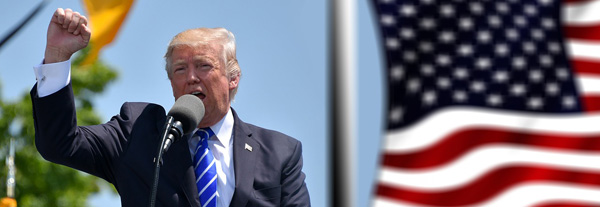Trump balances military threats and diplomatic hopes in Iran standoff

[This picture shows Donald Trump speaking on potential military action. Photo Credit to Pixabay]
In a surprising shift from his usual confrontational rhetoric, President Donald Trump has announced a two-week pause before deciding on potential military action against Iran’s nuclear program.
The decision comes following Israel’s bombing of Iranian nuclear facilities, intensifying a regional crisis that has brought the Middle East to the brink of wider conflict.
For the first time since taking office, Trump is signaling openness to diplomacy, citing a “substantial chance” for negotiations with Iran as European powers scramble to revive nuclear talks.
White House Press Secretary Karoline Leavitt delivered Trump’s statement Thursday, emphasizing that while military options remain on the table, the president is willing to give diplomacy an opportunity.
“Based on the fact that there’s a substantial chance of negotiations that may or may not take place with Iran in the near future, I will make my decision whether or not to go within the next two weeks,” Trump stated.
The measured tone represents a dramatic departure from earlier warnings issued by Trump, including social media threats urging the evacuation of Tehran and declarations that his patience had run out.
However, after Israel’s airstrikes successfully damaged key Iranian nuclear facilities—Trump praised the action and urged Iran to “make a deal before it’s too late.”
Behind the scenes, diplomatic machinery is grinding into action.
The administration’s special envoy to the Middle East, Steve Witkoff, is actively engaged with Iranian officials.
A sixth round of negotiations, possibly hosted by Oman, is being discussed.
European diplomats are working overtime, with Friday’s Geneva summit bringing together foreign ministers from the U.K., France, Germany, the EU, and Iran.
British Foreign Secretary David Lammy acknowledged after meeting U.S. officials that a short diplomatic window exists to prevent war.
Still, chances of a breakthrough are slim.
Iran has declared it will not negotiate while Israeli attacks continue.
European officials are preparing what they call a “take it or leave it” deal, demanding Iran end all uranium enrichment.
Unlike past proposals, which allowed some civilian enrichment, the current plan reflects the Trump administration’s firmer stance.
Military concerns continue to loom large.
The Fordow facility, a key Iranian enrichment site, remains a primary concern due to its fortified location that is impervious to Israeli strikes but vulnerable to U.S. bunker-busters.
Intelligence officials warn that Iran could resume full nuclear activities within months if talks collapse.
French Foreign Minister Jean-Noël Barrot noted that Iran could return to talks if a ceasefire is achieved.
France, like others in the EU, seeks a lasting rollback of both Iran’s nuclear and missile programs.
European leaders are cautious of U.S. military involvement, fearing it could widen the conflict.
EU foreign policy chief Kaja Kallas warned that escalation would “inflame the region,” which is “in nobody’s interest.”
The sentiment reflects growing international concern about the potential for a regional Middle East war that could disrupt global oil supplies and trigger economic instability.
Domestically, Trump faces a divided American public.
A Washington Post poll reveals that 45% of Americans oppose airstrikes, while only 25% support them.
Among Republicans, views are split, with nearly half backing strikes.
The political calculations add another layer of complexity to Trump’s decision-making process.
Leavitt maintained that Trump is not beholden to any group: “The president hears all voices... and makes decisions based on his instincts.”
She declined to elaborate on what factors might influence the final decision.
As diplomatic efforts unfold in Geneva, the world watches closely.
The next two weeks will reveal whether Trump chooses to double down on military threats or fully embrace diplomacy to avert a broader Middle East war.
The stakes could not be higher for regional stability and global security.

- Joseph Shin / Grade 12 Session 9
- Valley Christian High School

![THE HERALD STUDENT REPORTERS [US]](/assets/images/logo_student_us.png)
![THE HERALD STUDENT REPORTERS [Canada]](/assets/images/logo_student_ca.png)
